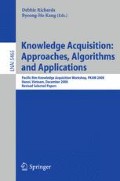Abstract
Association rule post-processing is a research challenge in KDD. In this post-processing task, objective interestingness measures are very useful for finding interesting rules possessing certain characteristics. Till now, the usual method for using objective interestingness measures is to select one or several suitable measures for filtering rules. This paper proposes a new approach to aggregate a set of interestingness measures using the Choquet integral as an advanced aggregation operator. Since an objective interestingness measure is considered as a point of view on rule quality, the aggregation of a set of objective interestingness measures can extract rules satisfying many points of view. The experiment is carried out on different groups (i.e. different natures) of objective interestingness measures to observe their behaviors.
Access this chapter
Tax calculation will be finalised at checkout
Purchases are for personal use only
Preview
Unable to display preview. Download preview PDF.
References
Agrawal, R., Imielinski, T., Swami, A.: Mining association rules between sets of items in large database. In: Proceedings of 1993 ACM SIGMOD International Conference on Management of Data, pp. 207–216 (1993)
Agrawal, R., Srikant, R.: Fast algorithm for mining association rules. In: Proceedings of the 20th Very Large Databases conference, pp. 487–499 (1994)
Klemettinen, M., Mannila, H., Ronkainen, P., Toivonen, H., Verkamo, A.I.: Finding interesting rules from large sets of discovered association rules. In: Proceedings of the Third International Conference on Information and Knowledge Management (CIKM 1994), pp. 401–407 (1994)
Tan, P., Kumar, V., Srivastava, J.: Selecting the right interestingness measure for association patterns. Information Systems 4(29), 293–313 (2004)
Guillet, F.: Mesures de la qualité des connaissances en ECD. In: EGC 2004 Actes des Tutoriels, 4e Conférence Francophone en Extraction et Gestion des Connaissances, pp. 1–60 (2004) (in French)
Huynh, H.X., Guillet, F., Blanchard, J., Kuntz, P., Gras, R., Briand, H.: A graph-based clustering approach to evaluate interestingness measures: a tool and a comparative study. In: Quality Measures in Data Mining. Studies in Computational Intelligence, pp. 25–50. Springer, Heidelberg (2007)
Blanchard, J., Guillet, F., Gras, R., Briand, H.: Using information-theoretic measures to assess association rules interestingness. In: ICDM 2005, Proceedings of the 5th IEEE International Conference on Data Mining, pp. 191–200 (2005)
Blanchard, J., Guillet, F., Gras, R., Briand, H.: Assessing rule interestingness with a probabilistic measure of deviation from equilibrium. In: ASMDA 2005, Proceeding of the 11th International Symposium on Applied Stochastic Models and Data Analysis, pp. 191–200 (2005)
Geng, L., Hamilton, H.J.: Interestingness measures for data mining: A survey. ACM Computing Survey 38(3), 1–32 (2006)
Choquet, G.: Theory of capacities. Annales de l’Institut Fourier 5, 131–295 (1953)
Silberchatz, A., Tuzhilin, A.: What makes pattern interesting in knowledge discovery systems. IEEE Transactions on Knowledge and Data Engineering 5, 970–974 (1996)
Sugeno, M.: Theory of fuzzy integrals and its applications. Ph.D thesis, Tokyo Institute of Technology (1974)
Shapley, L.: A value for n-person games. In: Kuhn, H., Tucker, A. (eds.) Contributions to the Theory of Games. Annals of mathematics studies edn., vol. 2, pp. 307–317. Princeton University Press, Princeton (1953)
Murofushi, T., Soneda, S.: Techniques for reading fuzzy measures (iii): interaction index. In: The 9th Fuzzy System Symposium, pp. 693–696 (1993)
Grabisch, M., Kojadinovic, I., Meyer, P.: A review of capacity identification methods for Choquet integral based multiattribute utility theory: Applications of the KAPPALAB R Package. European Journal of Operational Research 186(2), 766–785 (2007)
Asuncion, A., Newman, D.: UCI machine learing repository. University of California, Irvine, School of Information and Computer Sciences (2007), http://www.ics.uci.edu/~mlearn/MLRepository.html
Author information
Authors and Affiliations
Editor information
Editors and Affiliations
Rights and permissions
Copyright information
© 2009 Springer-Verlag Berlin Heidelberg
About this paper
Cite this paper
Nguyen Le, T.T., Huynh, H.X., Guillet, F. (2009). Finding the Most Interesting Association Rules by Aggregating Objective Interestingness Measures. In: Richards, D., Kang, BH. (eds) Knowledge Acquisition: Approaches, Algorithms and Applications. PKAW 2008. Lecture Notes in Computer Science(), vol 5465. Springer, Berlin, Heidelberg. https://doi.org/10.1007/978-3-642-01715-5_4
Download citation
DOI: https://doi.org/10.1007/978-3-642-01715-5_4
Publisher Name: Springer, Berlin, Heidelberg
Print ISBN: 978-3-642-01714-8
Online ISBN: 978-3-642-01715-5
eBook Packages: Computer ScienceComputer Science (R0)

